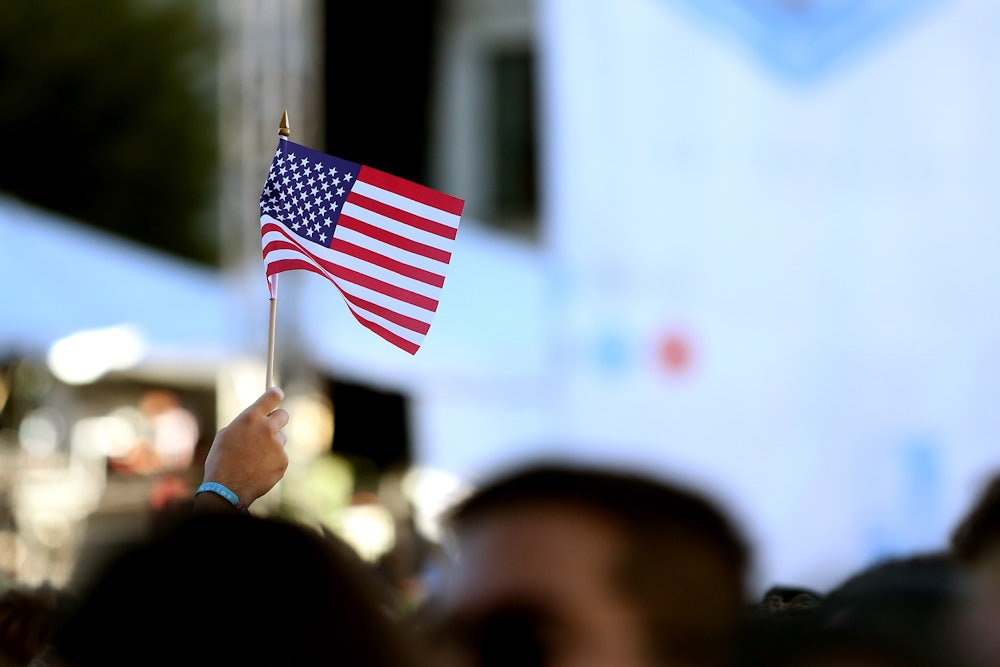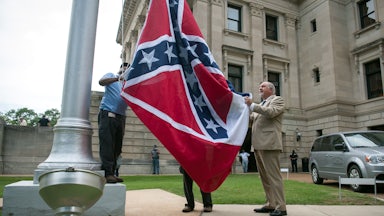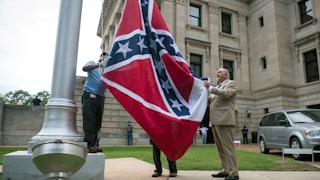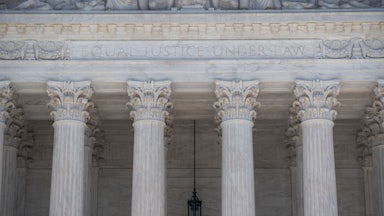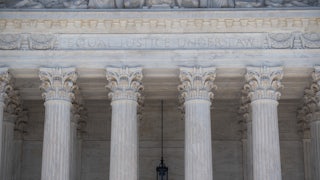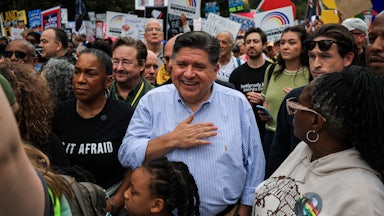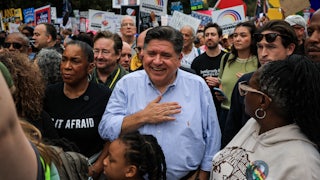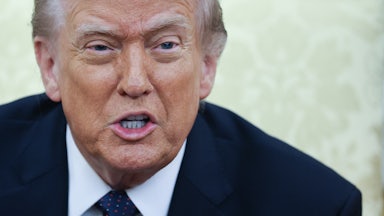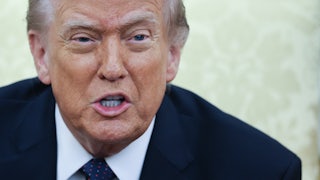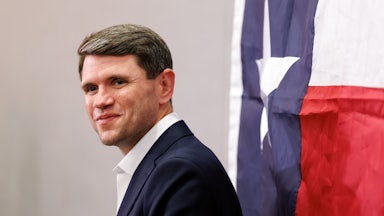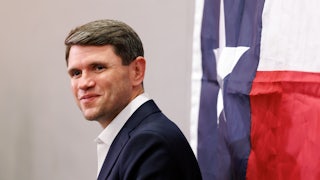The American flag is so firmly embedded in our national culture that it’s impossible to imagine any alternatives to it. But the Stars and Stripes wasn’t the first flag flown by Americans after breaking away from the British Empire, and the Patriot activists drew up a wide variety of ensigns and banners to proclaim their independence. The Massachusetts legislature even decreed that its forces would adopt a flag already used by George Washington’s ships: a white background with a green pine tree and the motto “APPEAL TO HEAVEN” emblazoned across it.
Two hundred and forty-five years later, a different kind of higher authority will hear a different kind of appeal about flags in Massachusetts. The Supreme Court will hold oral arguments in January in Shurtleff v. Boston, a First Amendment case involving one of the flagpoles outside the Boston City Hall. The dispute will require the justices to decide how far public officials can go in promoting certain symbols and emblems and restricting others on government property—and whether they can exclude religious flags altogether.
The case’s origins lie in an unusual vexillological tradition in Boston. Outside the city hall are three flagpoles: one for flying the American flag, one for flying the Massachusetts state flag, and one for flying Boston’s municipal flag. The city has a program that swaps out the city flag for one flown by private groups and citizens. “We want to create an environment in the City where everyone feels included, and is treated with respect,” the city explained on its website. “We also want to raise awareness in Greater Boston and beyond about the many countries and cultures around the world. Our goal is to foster diversity and build and strengthen connections among Boston’s many communities.”
To that end, Boston has flown all manner of flags from the third flagpole over the years. As the plaintiffs told the court in their petition, the city “has approved private groups’ flag raisings for celebrations of the countries of Albania, Brazil, Ethiopia, Italy, Panama, Peru, Portugal, Puerto Rico, Mexico, as well as China, Cuba, and Turkey, and for the flags of the private Chinese Progressive Association, National Juneteenth Observance Foundation, Bunker Hill Association, and Boston Pride.” Ironically, they noted, Massachusetts law allegedly forbids officials from displaying the “flag or emblem” of a foreign power outside most government buildings.
The plaintiff in the case, Harold Shurtleff, contacted the city in 2017 about hosting an event at Boston City Hall’s public spaces on Constitution Day that year. His organization, Camp Constitution, says its mission is “to enhance understanding of the country’s Judeo-Christian heritage, the American heritage of courage and ingenuity, the genius of the United States Constitution, and free enterprise.” In addition to hosting some speakers in the plaza, Shurtleff asked the city to fly a Christian flag, which consists of a white background with a red cross inside a blue upper-left canton, as part of the event.
Boston officials eventually denied the request after consulting with the city’s law department, citing the flag’s religious nature as their reason. In the 12 years preceding Shurtleff’s request, he told the justices, the city had approved 284 flag-raising events and had no records of denying a request during that period. A city official told Shurtleff that his request would be denied because of the city’s concerns about violating the Establishment Clause. The following year, the city issued its first formal guidelines on the flag-raising process. “At no time will the City of Boston display flags deemed to be inappropriate or offensive in nature or those supporting discrimination, prejudice, or religious movements,” it stated.
Shurtleff sued the city of Boston in federal court soon thereafter, arguing that the city had violated his First Amendment rights by discriminating against him on the basis of his views. He argued that the city had effectively created a public forum by allowing various private groups to fly their own flags on the third pole and that it had run afoul of his constitutional rights by denying him the right to do the same. “The Establishment Clause provides no compelling interest or other grounds to justify Boston’s censorship of Camp Constitution’s private religious speech in the City’s designated public forum,” he argued in his brief for the court.
The city of Boston disagreed with Shurtleff’s claim that the third flagpole amounted to a public forum, instead arguing that the flag-raisings amounted to government speech. This is a crucial distinction in First Amendment law. When the government speaks in its own voice, so to speak, it can choose to elevate one viewpoint over another. (Imagine if the Centers for Disease Control and Prevention had to give equal time to anti-vaccine activists in public service announcements.) When the government creates a neutral forum where other people can speak, however, it generally can’t restrict that speech based on the speaker’s viewpoint.
The First Circuit Court of Appeals sided with Boston, drawing upon two Supreme Court rulings, in particular. In Pleasant Grove City v. Summum, the high court sided with a Utah town that had declined a religious sect’s request to place a monument of its own teachings next to one honoring the Ten Commandments in a public park. And in Walker v. Texas Division, Sons of Confederate Veterans, the justices ruled that Texas officials could refuse to issue a license plate design that incorporated the Confederate battle flag without violating the First Amendment because license-plate designs amount to government speech. The First Circuit accordingly concluded that Boston officials have broad discretion to determine what flags can fly on public property as government speech.
Boston told the justices that it had been willing to let the rest of the event take place, which was slated to include speeches by local clergy and a “celebration of the Christian contributions” to the nation’s founding. But it drew the line at flying the flag sought by Shurtleff and his organization. “The City’s flagpole is not a public forum, it is government property, which the City may use in a manner best suited to its goals,” the city told the Supreme Court when it urged the justices not to hear the case. “[Shurtleff and Camp Constitution] therefore have no constitutional right to express their message on the City’s flagpole, nor can they force the City to express itself in a particular way.”
City officials also hinted that the rest of Shurtleff’s proposed event was a pretext for flying a religious flag from a public building. “It can be inferred from the circumstances that [Shurtleff and Camp Constitution] are not seeking permission to present their flag as part of an event celebrating the Christian religion or to engage in private speech, but are instead seeking to use the flagpole to obtain the powerful image of City approval of their religious views,” Boston told the court.
Shurtleff, on the other hand, argued that the city has already displayed religious imagery on the flagpole to varying degrees. He noted that Boston had previously flown the flag of Turkey, which includes the Islamic iconography of the crescent moon and star, and the flag of Portugal, the seal of which features imagery associated with Jesus’s wounds during the crucifixion and Judas’s betrayal for 30 pieces of silver. Boston’s own city flag includes the city seal, which features a Latin inscription that translates to “God be with us as he was with our fathers.” And when Pope John Paul II visited the city in 1976, Shurtleff noted, Boston allowed the Vatican flag to be raised over Boston Common.
By deciding whether the third flagpole in front of Boston City Hall is a neutral public forum or a vehicle for government speech, the justices could use the opportunity to clarify both doctrines. Boston told the court that there is “no history of governments allowing their flagpoles to be used in a way that does not express a message with which the government agrees” and warned that it could be forced to choose “between the prospect of cacophony on one hand and First Amendment liability on the other.” The unspoken implication was that Boston might abandon its flag-flying program altogether if it loses.
Complicating matters for the city, however, are the facts of the case itself. One city official told Shurtleff that he would have approved the flag in question if he had not identified it specifically as the “Christian” flag on the application. The city’s new policy, issued after Shurtleff’s request, lumped in flags of “religious movements” with flags that are “inappropriate or offensive in nature” and support “discrimination” and “prejudice.” And while Boston told the court that the flagpole wasn’t a public forum where the law is concerned, the city’s own application form for the flagpole and other city hall spaces states that the city “seeks to accommodate all applicants seeking to take advantage of the City of Boston’s public forums.” For a Supreme Court that is particularly sensitive to claims of religious discrimination these days, those details might be damning for Boston’s case.
Flags can be often among the most potent and emotionally charged symbols in modern life, so it’s little surprise that the justices often hear First Amendment cases about them. The Supreme Court has most notably decided whether they must be saluted or cannot be burned, with a major public backlash in the latter instance. There isn’t a flag-specific doctrine for free-speech cases; indeed, the court has often declined to treat the Stars and Stripes any differently for First Amendment purposes. But the justices have spoken from time to time about the special power that flags hold in the public imagination—and they’ll have another opportunity to do so in this case. After oral arguments in January, a ruling is likely to be handed down before the end of next June.
